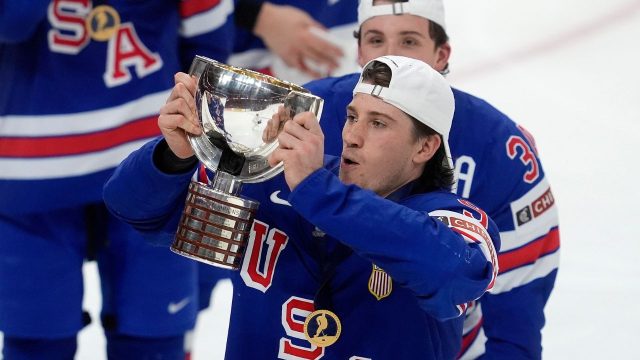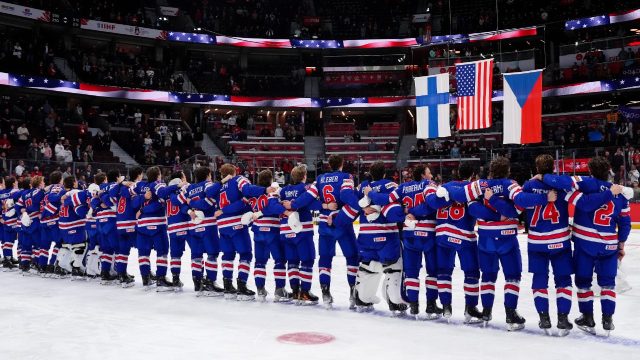
OTTAWA — Canada is the dominant hockey superpower, right?
Wrong.
Not after the United States won its first-ever back-to-back world junior championships with a thrilling 4-3 overtime victory over Finland Sunday night in Ottawa. The U.S. showed a lot of grit to storm back from 1-0 and 3-1 deficits against the Finns. Then, Teddy Stiga was the hero with a golden goal to last a lifetime on his first shot of the tournament.
The U.S. has close to 10 times the population of Canada, 18 more NHL teams and is generally more affluent than Canada in a sport where money talks.
Despite the Americans’ hiccup against Finland, losing in the preliminary round, they exacted revenge in the final. The U.S. has not lost a game in regulation in two consecutive tournaments and it’s now won three of the last five gold medals. Captain and tournament MVP Ryan Leonard called the Americans “a dynasty.” They are surely trending in that direction.
Over the northern border, Hockey Canada management had a discombobulated approach to selecting their team. They passed on three players drafted in the top 10 of last year’s draft in Carter Yakemchuk, Zayne Parekh and Beckett Sennecke while the coaching staff made one baffling decision after another, including not practising throughout the tournament.
It showed in the Americans’ resounding win over Canada on New Year’s Eve.
Throughout the whole tournament, the U.S. didn’t complicate things like Canada did. It played its top stars Leonard, James Hagens, and Gabe Perreault heavy minutes and was rewarded with a combined 29 points. Hagens, who is known for his flash and skill, showed his grit. In the first period, after the Finns took an early lead, Hagens jammed the puck multiple times in front of the net to score an ugly, but timely, goal to tie the game 1-1.
Later, Finland pushed to score two unanswered to take a 3-1 lead early in the second period, but the U.S. rammed back immediately.
The U.S. dominated for stretches, eventually making its own luck by outshooting the Finns 15 to four in the second frame.
A fortuitous shot from Brandon Svoboda beat Finland’s Petteri Rimpinen and cut the lead to 3-2 in the second period. Then Cole Hutson, who was the most electric defenceman in the entire tournament, scored to tie the game 3-3 with a wonderful toe-drag into a shot late in the second period.
Shift your lens to Canada for comparison, which didn’t play 2026 top draft prospect Gavin McKenna on the first line until a must-win quarterfinal and left two offensive stud defencemen in Parekh and Yakemchuk at home.
Talent wins out.
The problem is that Canada could once conceivably say they always had the most talented team at the world juniors. Now, it’s a pick’em, if not the slight edge to the Americans in recent years. The United States has a national development program while Canada does not, and the U.S. is seeing the gold medals from its labour. Almost every great American player in the NHL these days has gone through the program, including Auston Matthews, Jack Eichel and the three Hughes brothers. It used to be that people asked which province in Canada was the hotbed of hockey talent. Now you might ask which state.
It’s not that Canada can’t win anymore at the world juniors or at the men’s senior level. It’s just that the landscape has changed and Canadians need to get used to it.
Just look at the upcoming 4 Nations Face-off rosters. You can quibble with who is better, but it is clear that the U.S. has better goaltenders and their forwards and defence are comparable to Canada’s.
As the NHL grows and more expansion teams cover the map, it’ll be harder for Canada to outpace the U.S. in terms of the talent it produces. We’ve seen the passing of the torch happen at the world junior stage in Ottawa and we very well could see that run of success continue at the 4 Nations Face-Off.
The biggest discrepancy between the two countries at the NHL level is in goal where the Americans were able to comfortably leave Vezina finalist Thatcher Demko at home. No matter who starts between Connor Hellebuyck, Jeremy Swayman and Jake Oettinger, the Americans will have an edge over Canada at the most important position.
In Sunday’s gold-medal game, American Trey Augustine demonstrated the rise of American goaltenders. The Detroit Red Wings prospect is now the winningest goaltender in U.S. world junior history with 12 victories and kept his team alive with huge saves in the first two periods against Finland. The U.S. looks to have the edge in net for years to come, though it should be noted that goalie Carter George was Canada’s best player for long stretches of this tournament, too.
If there is some optimism for Canada, it is that the country continues to develop elite skaters. Connor Bedard and Macklin Celebrini are already making a mark in the NHL while CHL stars Gavin McKenna and Landon Dupont are only a few years away from doing the same.
But overall, the gap is closing and the NHL currently has 365 Canadian players (40.83 per cent) compared to 259 Americans (28.97 per cent). Roughly half of the NHL was Canadian just a decade ago.
A wave of U.S. talent is coming. Cole Hutson, younger brother to Canadiens rookie sensation Lane, became the first defenceman to ever lead the world juniors in scoring with 11 points.
The Hutsons are the future of U.S. hockey, following the impact the Hughes and Tkachuk brothers are already making at the top level.
U.S. coach David Carle was asked after the gold medal game about the growth of hockey in his country.
“You look at the sheer demographics of the population and the grassroots that’s going on by USA Hockey and by many of the NHL teams and growing the game,” Carle said. “The player pool continues to get bigger, deeper, more talented, so in my opinion, (that) is a sign of things to come, and we’re really proud of the fact that we’re able to win back-to-back and be the first team to do that in USA hockey history. But I think for us, it’s keeping on this path and making sure that we continue to raise the bar and have the standard.”
Brady Tkachuk and his American teammates on the Ottawa Senators — Jake Sanderson, Shane Pinto and Josh Norris — were in attendance Sunday, celebrating every goal. Americans are even taking over Canadian NHL teams.
The Americans were the best team in this tournament and deserved to win.
Get used to it, Canada — the United States may be taking over as hockey’s dominant superpower.






